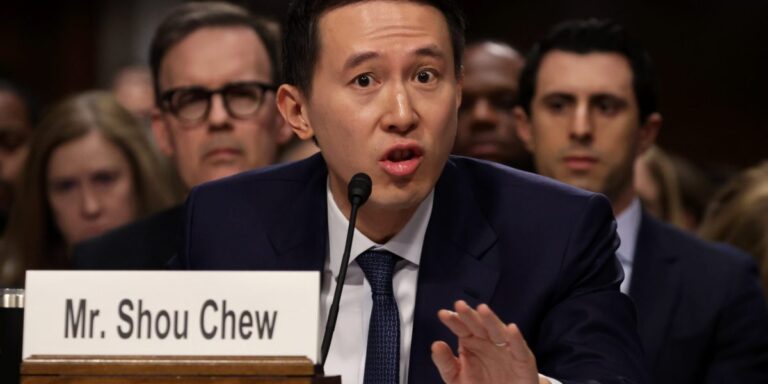In a new attack on one of the world’s most popular technology companies, the Department of Justice late on Friday accused TikTok of using its ability to collect reams of information about its users based on their opinions on socially divisive issues such as gun control, abortion and religion.
In documents filed with the U.S. Court of Appeals for the Federal Circuit in Washington, government lawyers wrote that TikTok and its Beijing-based parent company, ByteDance, used an internal web suite system called Lark to allow TikTok employees to speak directly to ByteDance engineers in China.
Federal officials said TikTok employees used Lark to transmit sensitive data about U.S. users that was ultimately stored on servers in China and accessible to ByteDance employees in China.
According to the filing, one of Lark’s internal search tools allowed ByteDance and TikTok employees in the U.S. and China to collect information about users’ content and expression, including opinions on sensitive topics such as abortion and religion. Last year, The Wall Street Journal reported that TikTok tracked users who viewed LGBTQ content through a dashboard that the company said it had since removed.
The new court documents mark the government’s first major defense in a major legal battle over the future of the popular social media platform used by more than 170 million Americans. The company could be banned within months if it doesn’t cut ties with ByteDance under a law signed by President Joe Biden in April.
The bill passed with bipartisan support after lawmakers and administration officials expressed concerns that Chinese authorities could force ByteDance to hand over U.S. user data or manipulate algorithms that appear in users’ feeds to tilt public opinion in Beijing’s interests.
The Justice Department issued a strongly worded warning about the possibility of so-called “covert content manipulation” by the Chinese government, saying algorithms could be designed to shape the content users receive.
“By directing ByteDance and TikTok to covertly manipulate their algorithms, China could, for example, further its existing malign influence operations and strengthen its efforts to undermine trust in our democracies and exacerbate social divisions,” the report said.
The Justice Department alleges that its concerns are not theoretical: TikTok and ByteDance employees have been known to engage in a practice known as “heating,” in which certain videos are promoted to get a certain number of views. The feature allows TikTok to curate popular content and distribute it more widely, but U.S. authorities say it could also be used for nefarious purposes.
Federal authorities are asking the court to allow them to submit confidential versions of the legal briefs to which the companies do not have access.
The redacted version of the brief “does not change the fact that the Constitution is on our side,” TikTok spokesman Alex Haurek said in a statement.
“Banning TikTok would silence the voices of 170 million Americans and violate the First Amendment,” Haurek said. “As we have said before, the administration has never provided any evidence for its claims, either when Congress passed this unconstitutional bill. Today, the administration is once again hiding behind secret intelligence as it takes this unprecedented step. We are confident we will prevail in court.”
The Justice Department said in redacted court documents that another tool triggered content throttling based on the use of certain words. That tool’s specific policies applied to ByteDance users in China, where ByteDance operates a similar app called “Douyin” that is subject to Beijing’s strict censorship rules.
But Justice Department officials said different policies may have been applied to TikTok users outside of China. TikTok is investigating the existence of those policies and whether it was ever used in the U.S. around 2022, the officials said.
The government has cited Lark’s data transfers as a reason federal officials don’t believe Project Texas, TikTok’s $1.5 billion mitigation plan to store U.S. users’ data on servers owned and controlled by tech giant Oracle, is sufficient to prevent national security concerns.
In its lawsuit against the law, TikTok contends that the ban violates the First Amendment because it would bar continued speech on the app unless it acquires new owners through a complicated sale process. It also argues that a sale would change speech on the platform because new social platforms would lack the algorithms that drove their success.
In its response, the Justice Department argued that TikTok has not made a valid free speech claim, that the law addresses national security concerns without targeting protected speech, and that China and ByteDance are foreign companies and therefore not protected by the First Amendment.
TikTok also cited some lawmakers who criticized the platform for showing anti-Israel leanings during the Gaza war and argued that U.S. law discriminates against views.
Justice Department officials dispute that claim, saying the law in question reflects ongoing concerns by officials that China could weaponize technology against U.S. national security, a concern exacerbated by requirements for Beijing-controlled companies to hand over sensitive data to the government. The officials say that under its current operating structure, TikTok would be required to comply with those demands.
Oral arguments in the case are scheduled for September.

